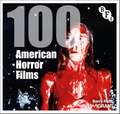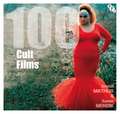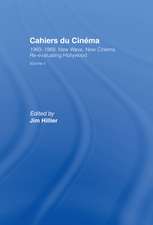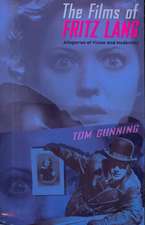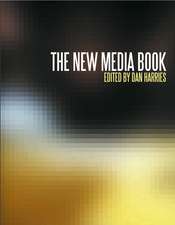100 Film Noirs: Bfi Screen Guides
Autor Jim Hillier, Alastair Phillipsen Limba Engleză Paperback – 17 mai 2009
| Toate formatele și edițiile | Preț | Express |
|---|---|---|
| Paperback (1) | 118.25 lei 22-36 zile | +106.40 lei 6-12 zile |
| Bloomsbury Publishing – 17 mai 2009 | 118.25 lei 22-36 zile | +106.40 lei 6-12 zile |
| Hardback (1) | 536.84 lei 22-36 zile | |
| British Film Institute – 18 mai 2009 | 536.84 lei 22-36 zile |
Preț: 118.25 lei
Preț vechi: 206.72 lei
-43% Nou
Puncte Express: 177
Preț estimativ în valută:
22.63€ • 23.68$ • 18.83£
22.63€ • 23.68$ • 18.83£
Carte disponibilă
Livrare economică 10-24 martie
Livrare express 22-28 februarie pentru 116.39 lei
Preluare comenzi: 021 569.72.76
Specificații
ISBN-13: 9781844572168
ISBN-10: 1844572161
Pagini: 280
Ilustrații: 35 b/w photos
Dimensiuni: 123 x 168 x 25 mm
Greutate: 0.41 kg
Ediția:2009
Editura: Bloomsbury Publishing
Colecția British Film Institute
Seria Bfi Screen Guides
Locul publicării:London, United Kingdom
ISBN-10: 1844572161
Pagini: 280
Ilustrații: 35 b/w photos
Dimensiuni: 123 x 168 x 25 mm
Greutate: 0.41 kg
Ediția:2009
Editura: Bloomsbury Publishing
Colecția British Film Institute
Seria Bfi Screen Guides
Locul publicării:London, United Kingdom
Caracteristici
Includes classic films such as Double Indemnity alongside more recent movies including Sin City
Notă biografică
JIM HILLIER is Visiting Lecturer in the Department of Film and Television Studies at the University of Reading. His publications include American Independent Cinema (2001), The Film Studies Dictionary (2000) and Howard Hawks: American Artist (1996). ALASTAIR PHILLIPS is Associate Professor in the Department of Film and Television Studies at the University of Warwick. He is the author of Rififi (2008) and the co-editor of Japanese Cinema: Texts and Contexts (2007) and of Journeys of Desire: European Actors in Hollywood (2006).
Cuprins
BFI SCREEN GUIDES.- 100 FILM NOIRS FINAL.- Acknowledgements.- Introduction.- 100 Films:.- 36, Quai des orfèvres (Olivier Marchal, 2004).- The American Friend (Wim Wenders, 1977).- Asphalt Jungle (John Huston, 1950).- La Bête humaine (Jean Renoir, 1938).- The Big Combo (Joseph H Lewis, 1955).- The Big Heat (Fritz Lang, 1953).- The Big Sleep (Howard Hawks, 1946).- Blast of Silence (Alan Baron, 1961).- The Blue Dahlia (George Marshall, 1946).- Body and Soul (Robert Rossen, 1947).- Born to Kill (Robert Wise, 1947).- Brighton Rock (John Boulting, 1947).- Call Northside 777 (Henry Hathaway, 1947).- Castle of Sand (Nomura Yoshitaro, 1974).- The Chase (Arthur Ripley, 1946).- Chinatown (Roman Polanski, 1974).- C.I.D. (Raj Khosla, India, 1954).- Collateral (Michael Mann, 2004).- Cornered (Edward Dmytryk, 1945).- Criss Cross (Robert Siodmak, 1948).- The Crooked Way (Robert Florey, 1949).- Crossfire (Edward Dmytryk, 1947).- Cry of the City (Robert Siodmak, 1948).- The Dark Corner (Henry Hathaway, 1946).- Dark Passage (Delmer Daves, 1947).- Dead Reckoning (John Cromwell, 1947).- Death of a Cyclist (Javier Bardem, 1955).- Death is a Caress (Edith Carlmar, 1949).- Detour (Edgar G. Ulmer, 1945).- Devil in a Blue Dress (Carl Franklin, 1995).- D.O.A. (Rudolph Maté, 1949).- Double Indemnity (Billy Wilder, 1944).- The Driver (Walter Hill, 1978).- Fallen Angel (Otto Preminger, 1945).- Fear in the Night (Maxwell Shane, 1947).- Force of Evil (Abraham Polonsky, 1948).- A Foreign Land (Walter Salles, Brazil).- Get Carter (Mike Hodges, 1971).- Gilda (Charles Vidor, 1946).- The Glass Key (Stuart Heisler, 1942).- Gun Crazy (Joseph H Lewis, 1949).- He Ran All the Way (John Berry, 1951).- He Walked By Night (Alfred Werker, 1949).- High and Low (Akira Kurosawa, 1963).- A History of Violence (David Cronenberg, 2005).- The Hitch-hiker (Ida Lupino, 1953).- I'll Sleep When I'm Dead (Mike Hodges, 2003).- In a Lonely Place (Nicholas Ray, 1950).- I Married a Communist (Robert Stevenson, 1949).- I Wake Up Screaming (H Bruce Humberstone, 1942).- I Walk Alone (Byron Haskin, 1948).- Journey into Fear (Norman Foster/Orson Welles, 1942).- Le Jour se lève (Marcel Carné, 1939).- Lift to the Scaffold (Louis Malle, 1957).- The Killers (Robert Siodmak, 1946).- The Killing (Stanley Kubrick 1956).- Kiss Me Deadly (Robert Aldrich, 1955).- Kiss of Death (Henry Hathaway, 1947).- LA Confidential (Curtis Hanson, 1997).- The Lady from Shanghai (Orson Welles, 1947).- The Lady in the Lake (Robert Montgomery, 1946).- Laura (Otto Preminger, 1944).- The Long Goodbye (Robert Altman, 1973).- The Lost One (Peter Lorre, 1951).- M (Fritz Lang, 1931).- Memories of Murder (Joon-ho Bong, 2003).- The Maltese Falcon (John Huston, 1941).- Mildred Pierce (Michael Curtiz, 1945).- Mulholland Dr. (David Lynch, 2001).- Murder My Sweet (Edward Dmytryk, 1944).- The Narrow Margin (Richard Fleischer, 1952).- Night and the City (Jules Dassin, 1950).- Nightmare Alley (Edmund Goulding, 1947).- Night Moves (Arthur Penn, 1975).- Odd Man Out (Carol Reed, 1947).- Odds Against Tomorrow (Robert Wise, 1959).- On Dangerous Ground (Nicholas Ray, 1951).- Out of the Past (Jacques Tourneur, 1947).- Phantom Lady (Robert Siodmak, 1944).- Pickup on South Street (Samuel Fuller, 1953).- Pitfall (André de Toth, 1948).- Point Blank (John Boorman, 1967).- The Postman Always Rings Twice (Tay Garnett, 1946).- Pursued (Raoul Walsh, 1947).- Quai des orfèvres (Henri-Georges Clouzot, 1947).- The Reckless Moment (Max Ophuls, 1949).- Rififi (Jules Dassin, 1955).- Scarlet Street (Fritz Lang, 1945).- Shoot the Pianist (François Truffaut, 1960).- Side Street (Anthony Mann, 1950).- Sin City (Frank Miller and Roberto Rodriguez, 2005).- Story of a Love Affair (Michelangelo Antonioni, 1950).- Sunset Boulevard (Billy Wilder, 1950).- Taxi Driver (Martin Scorsese, 1976).- They Live By Night (Nicholas Ray, 1948).- T Men (Anthony Mann, 1947).- Touchez
Recenzii
100 Film Noirs offers many insights into the history and visual grammar of the genre and provides the perfect excuse to revisit some classics and discover some forgotten masterpieces.
100 Film Noirs has a strong international dimension and provides new and revealing insights into film noirs from France, Germany, Japan, India, Mexico and beyond
Both a treasure trove of facts and a taster for those keen to find out more about the seamier side of life...
This new volume in the successful "BFI Screen Guides" series provides an entertaining and authoritative guide to the genre through an examination of 100 key films. "Film Noir" is a popular and widely-studied genre. The authors are both high-profile film scholars. It includes classic films such as "Double Indemnity" alongside more recent movies including "Sin City". Richly illustrated with images from the films are discussed. It also includes examples from Europe, Japan, India and Mexico, together with an editorial overview of the genre and its key debates.
As has already been indicated, this is an authoritative work, as one might expect with the imprint of the British Film Institute. It is extremely readable in style and is recommended for students of film studies in school, college, or university, as well as for public libraries where it would be eagerly read by lovers of film noir.
...takes into account the fact that film noir as a genre has influenced films in France, Japan, Germany, Mexico and India, so there is welcome inclusion of films other than the classics, showing how diverse the influence is.
100 Film Noirs has a strong international dimension and provides new and revealing insights into film noirs from France, Germany, Japan, India, Mexico and beyond
Both a treasure trove of facts and a taster for those keen to find out more about the seamier side of life...
This new volume in the successful "BFI Screen Guides" series provides an entertaining and authoritative guide to the genre through an examination of 100 key films. "Film Noir" is a popular and widely-studied genre. The authors are both high-profile film scholars. It includes classic films such as "Double Indemnity" alongside more recent movies including "Sin City". Richly illustrated with images from the films are discussed. It also includes examples from Europe, Japan, India and Mexico, together with an editorial overview of the genre and its key debates.
As has already been indicated, this is an authoritative work, as one might expect with the imprint of the British Film Institute. It is extremely readable in style and is recommended for students of film studies in school, college, or university, as well as for public libraries where it would be eagerly read by lovers of film noir.
...takes into account the fact that film noir as a genre has influenced films in France, Japan, Germany, Mexico and India, so there is welcome inclusion of films other than the classics, showing how diverse the influence is.
Descriere
Descriere de la o altă ediție sau format:
This BFI Screen Guide provides an accessible, richly-illustrated introduction to 100 key noir films, from Hollywood classics such asDouble Indemnityto more recent titles such asSin City, as well as examples from Europe, Japan, India and Mexico, together with an editorial overview of the genre and its key debates.
This BFI Screen Guide provides an accessible, richly-illustrated introduction to 100 key noir films, from Hollywood classics such asDouble Indemnityto more recent titles such asSin City, as well as examples from Europe, Japan, India and Mexico, together with an editorial overview of the genre and its key debates.
Textul de pe ultima copertă
Film
noir's
popularity
with
cinema
audiences,
enthusiasts
and
scholars
has
remained
unabated
since
post-war
French
critics
began
discerning
a
new
trend
in
American
film
with
the
release
of
such
stylish
and
atmospheric
crime
features
asDouble
IndemnityandMurder,
My
Sweet.
Many
of
Hollywood's
greatest
directors
such
as
Fritz
Lang
and
Robert
Siodmak
are
now
closely
associated
withfilm
noir's
psychologically
acute
observations
of
the
darker
contours
of
the
American
urban
landscape.
Thanks
to
evocative
cinematography,
sharp
writing
and
powerful
performances,
these
films
have
had
an
enduring
influence
on
international
visual
culture.
100 Film Noirsprovides an authoritative overview offilm noirpast and present by examining its core films and themes and providing an accessible introduction to critical debates. The book goes beyond the classical canon to examine the ways in whichnoircontinues to have a diverse influence on American cinema. It demonstrates the way thatnoirhas intervened in other more established Hollywood genres and also considers numerous lesser-known examples of the field. Importantly,100 Film Noirshas a strong international dimension and provides new and revealing insights intofilm noirsfrom France, Germany, Japan, India, Mexico and beyond.
100 Film Noirsprovides an authoritative overview offilm noirpast and present by examining its core films and themes and providing an accessible introduction to critical debates. The book goes beyond the classical canon to examine the ways in whichnoircontinues to have a diverse influence on American cinema. It demonstrates the way thatnoirhas intervened in other more established Hollywood genres and also considers numerous lesser-known examples of the field. Importantly,100 Film Noirshas a strong international dimension and provides new and revealing insights intofilm noirsfrom France, Germany, Japan, India, Mexico and beyond.


